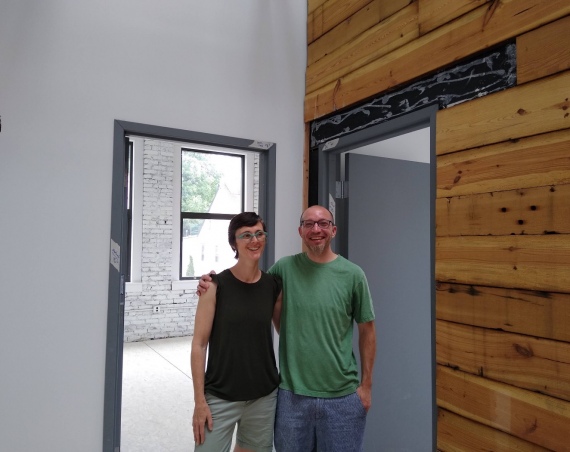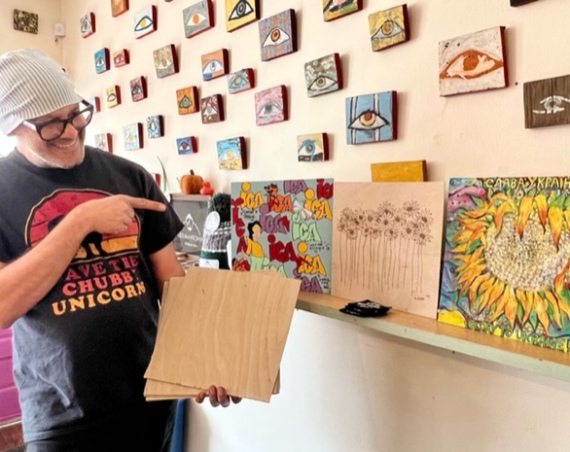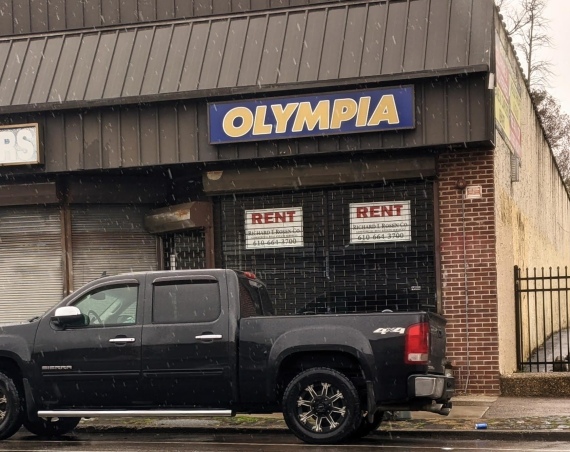
It’s officially Pride Month, where the identities that fall under the vast spectrum of the Lesbian, Gay, Bisexual, Transgender, Queer, Intersex, Asexual, and other (LGBTQIA+) communities celebrate our contributions to theirstory (you read that correctly) and overall tenaciousness through decades and generations of oppressive systems. Though we feel the spirit of Pride in all of its honor, self-worth, gratification, and dignity throughout the year, in our day-to-day lives, we are given June to be celebrated by the masses.
As a Germantown born Queer, Non-Binary, Black person, I’ve always felt that while Germantown is credited with its historical legacy in the struggle for racial equity and its growing literary legacy, with names like Ursula Rucker and Sonia Sanchez, it isn’t credited nearly enough with what neighbor Emaleigh Doley says is “otherness.”
Being in and around Germantown for almost thirty years, I seldom find spaces and places where folks with similar and intersecting identities as me can get together and be — not doing anything specific — but be. With this in mind, I thought of creating a list that I hope will be a launchpad for neighbors to see who contributes to the neighborhood’s Pride spirit (and possibly where). In reading, I hope folks will use this as an opportunity to see where there is synergy, connect, and create places and spaces of love, imagination, and endless possibility.
These folks I have identified are game changers in the neighborhood and our City of Siblingly (you read it right) Love & Affection — Philadelphia — overall. These folks, to me, deserve to be seen, acknowledged, and celebrated (note: all three terms are different) for what they do for us and the blueprints they will provide for future generations. And this is my thank you. If you aren’t listed but are doing great things — or simply just existing and being — thank you, too.
I hope this will be an inaugural thing and will continue for years to come–even after my departure (which I hope will be decades from now). So, if I don’t get you now, I may hopefully get you later.
Please note that the responses to the two major questions I have asked of folks have not been cut or reduced. As the editor of the Germantown Info Hub, I believe that for a hyperlocal, or any other news outlet, it’s crucial, now more than ever, in an era of censorship, to uplift the voices of those living on the margins and hear what they have to say. And even more, especially for a publication that doesn’t get to cover LGBTQIA-centered things as often as I’d hope. So, as they intended, no matter how lengthy, is how their sentiments appear — period.
Below are your neighbors, some of whom you may know and some you may not, who help cultivate Pride in the neighborhood.
Andre Carroll
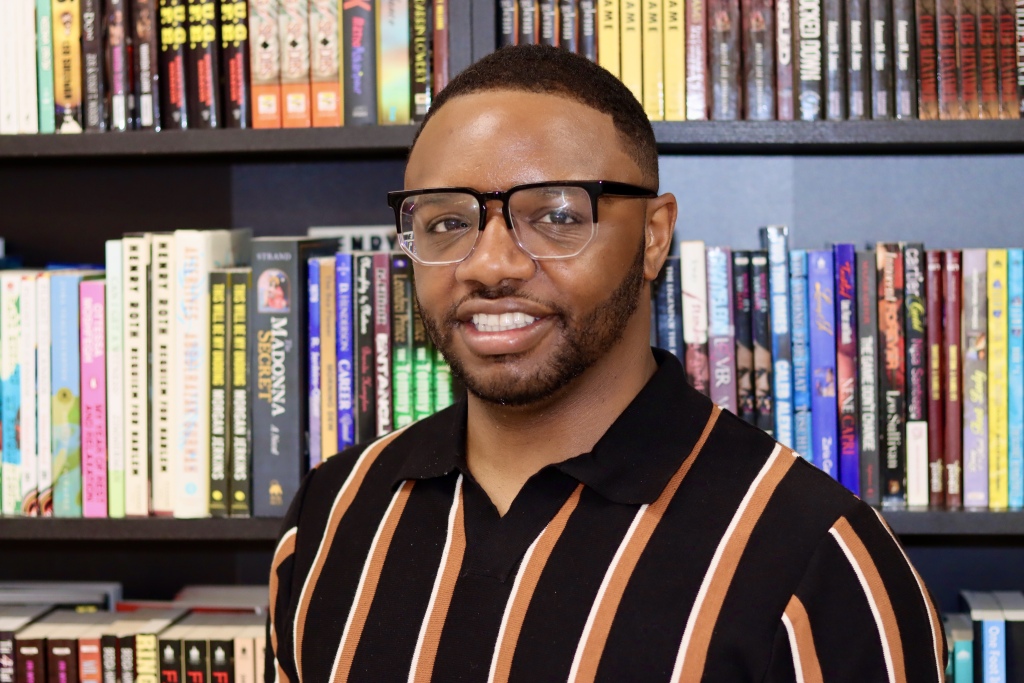
Andre D. Carroll, born and raised in Germantown, has spent nearly a decade organizing to improve government at the state and city levels. Raised by his grandmother, he is a proud product of Philly public schools and understands the challenges of growing up in an underserved neighborhood. After his grandmother’s passing, he dedicated himself to supporting his younger brother and pursued a career in public service. As an educator, he created a financial literacy program for high school students while working for the City Controller’s Office.
Andre has volunteered for critical elections, managed campaigns, and assisted constituents for State Senator Anthony H. Williams. He serves on the boards of The Brothahood Foundation and the Philadelphia District Attorney’s Youth Aid Panel, advocating for incarcerated juveniles and youth intervention programs. Andre is slated to be the next state representative for the 201st Legislative District, making him the second openly gay Black rep.
What does Pride mean to you?
“Pride is an opportunity to celebrate the existence of people who for so long have been, you know, ignored and overlooked and, you know, taken out of history. It’s an opportunity for people to be proud of who they are, and it’s an opportunity for us to celebrate, you know, our existence honestly and a lot of the work we’ve been able to put in and the spaces we haven’t received acknowledgment. And it’s an opportunity for us to find or to share our self-worth.”
What LGBTQIA+ work or advocacy would you like to see more of in Germantown?
“You know, one of the things that I often mention is when I talk about LGBTQ folks, and just the concerned issues that I deeply care about is that we’re included in all of that. Right? Like when we talk about housing, when we’re talking about the issues when it comes to mass incarcerations, when we’re talking about the lack of representation when it comes to equal employment. You know, all those things that this community has been held back in those spaces. So I think just making sure that in all that we’re doing to move people forward, that we’re making sure that we make room for, you know, Queer people to exist and be heard.
“You know, we just get put in a small box like these are LGBTQ issues. No, these are issues of humanity. It’s not just about what my sexuality is. Everyone deserves housing; everyone deserves a job. Everyone deserves the opportunity to live in peace and be safe. Right. And I think that, like, a lot of the times that we don’t see, you know, advocacy for LGBTQ people happening at the same time that we’re talking about, like, safety, talking about housing, talking about equal employment and those things.”
Neighbor Uplift
“I’m such a big fan of Gary Hines. Gary does so much. I attended an event he had down at the free library about two months ago, and it was just so much history about Philadelphia. And, of course, I just didn’t even know. So, he’s one person,
“Barbara Kigozi [is another]. She was a committee person over there in the 59th [Ward Democratic Committee]. She lives on East Haines Street and works for Councilmember Rue Landau right now. She’s another one. I really, really adore her. So those are two of my faves in Germantown. And, you know, they do really great work.”
Kristen Clark
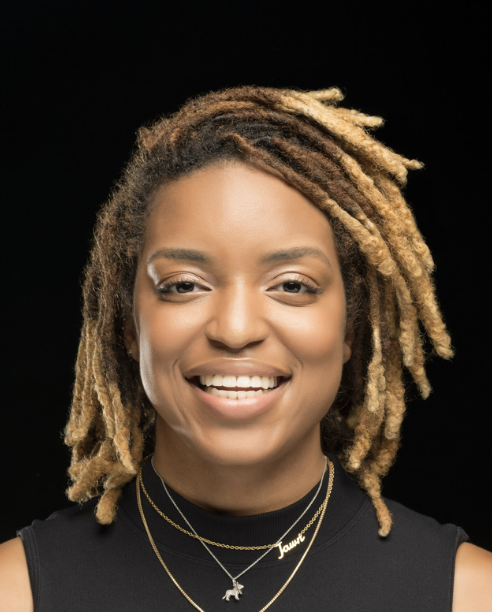
Germantown native Kristen Clark (she/they) is a Queer woman who loves “good people” and focuses on creating empowering spaces for self-exploration and creativity with empathy and unrestricted love. She is the owner and founder of the KDD Theatre and Germantown Arts District (GAD Philly). Everything she does “ties back to the general ethos of making sure that we can build community with people who see themselves in other people.”
What does Pride mean to you?
“You know, this is a great question because when you asked if you wanted to be a part of the Germantown pride thing, I was like, Black pride or Gay Pride? Which Pride? And once I asked, I didn’t think it mattered because they’re slightly interchangeable. And I say it this way. Pride, for me, is not being limited to defining who you are, saying who you are, and just being loud and proud about it. I think the other portion of Pride is being who you are. Unapologetically and being able to show up as who you are in a space where you feel liberated to do whatever your heart desires.
“Pride, to me, is freedom. You know, it’s my journey. It’s finding out that, hey, I’m a little zesty, naturally, you know, it’s about being able to love people unapologetically. It’s about being able to love people unconditionally and not be limited. Pride is unlimited love for me. And unrestricted love.”
What LGBTQIA+ work or advocacy would you like to see more of in Germantown?
“For me, there is no separation. I am who I am. Period. I will always be Kris. And that comes with me being Black, that comes with me being Queer, that comes with me being a woman, and that it comes with a lot. And you can’t separate it. So, I would like Germantown to become a place that not only understands and cherishes but also practices it and puts some structure around it.
“Not to MLK [Jr] it, but my hope is that one day, it won’t have to be separate. It won’t have to be a ‘This is an LGBTQIA+ joint.’ Like, it can just be a joint. And because it’s compassionate and because it’s unrestricted love, and we’re showing that we care about people, and it’s rooted in this idea of empathy that everyone feels included. It doesn’t feel excluded. So I would love to see Germantown take leadership around doing that.”
Doriana Diaz
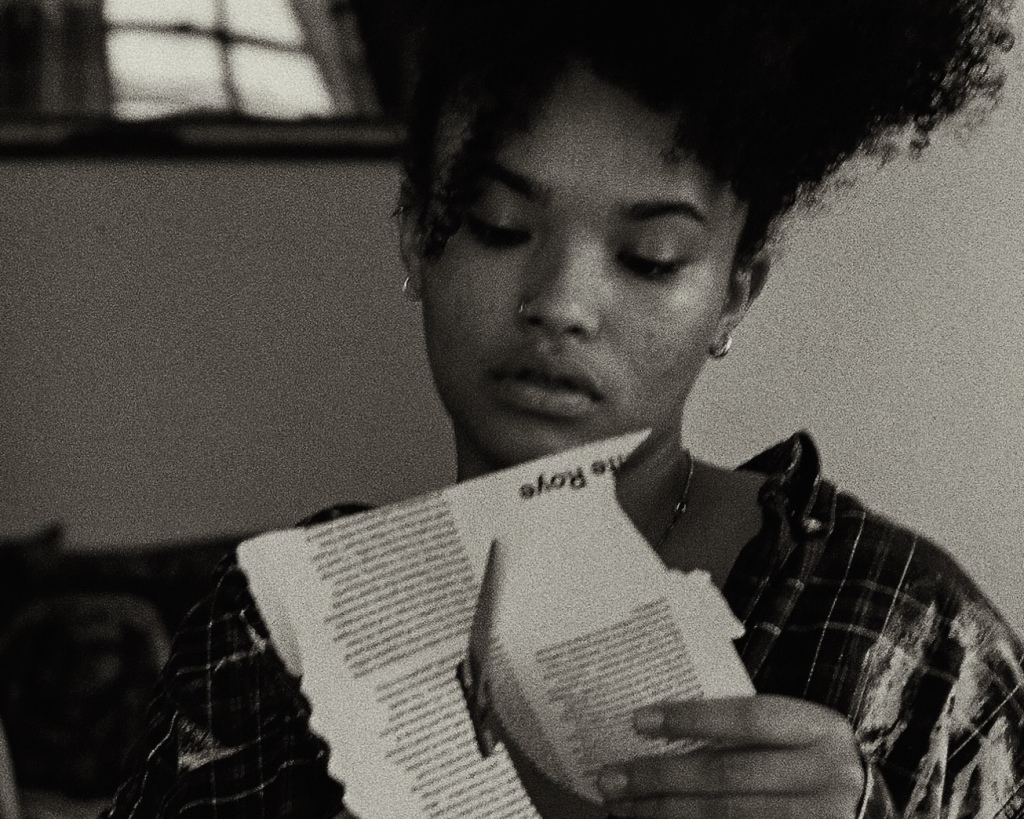
Doriana Diaz (she/they) identifies as a Queer Afro-Latina. She is a multidimensional artist, archivist, and memory worker with roots in Philadelphia’s vibrant cultural scene. Her work delves into cultural empowerment, archival preservation, and the enduring spirit of resistance and growth.
What does Pride mean to you?
“Pride is a way of life, not only celebrated in June. Pride gives all of us a way to explore the liberation of our identities, specifically those who have been systematically oppressed by colonial ideology. Pride is a praxis, a way of loving without expectation, a deep devotion to holding space. It is a dedication to the joy of community and cultural healing through any channel of agency.”
What LGBTQIA+ work or advocacy would you like to see more of in Germantown?
“More art, more celebrations, more community care, more avenues for liberation to be explored in safe and honest spaces for us and made by us.”
What neighbors would you like to uplift?
“Kiersten Adams for their work at Awbury Arboretum!”
Emaleigh Doley
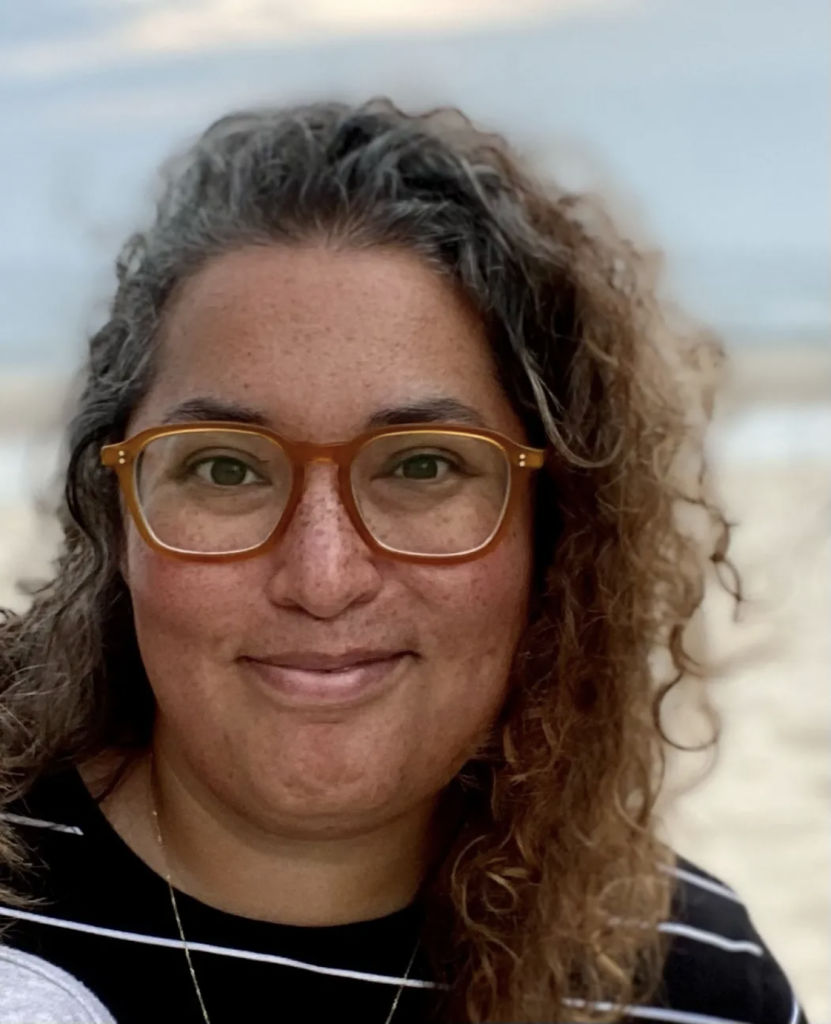
Emaleigh Doley (she/her) identifies as Gay and has always been deeply involved in her community, particularly in Germantown, Philadelphia. After moving back to her childhood block on West Rockland Street following college, she co-founded The W Rockland Street Project with her sister in response to the 2009 foreclosure crisis. This grassroots initiative aimed to counteract the neighborhood’s decline due to negligent property owners. Emaleigh transitioned her passion for community activism into her professional life, first working in marketing and public relations for arts and cultural organizations and later as a consultant for various Philadelphia-based initiatives.
In 2015, she joined Germantown United CDC as a corridor manager after helping to form the organization’s first board of directors. Emaleigh has driven community economic development for nearly a decade and fostered local engagement in Germantown. Despite her decision to leave Germantown United, she remains committed to the community and excited about its future. Outside her professional endeavors, she enjoys drawing pen and ink designs and spending time at the beach.
What does Pride mean to you?
“I think pride is just being who you are, being comfortable with you, who you are, being proud of who you are. So, I think that’s what pride means to me. I’m one of those people that’s, like, I am. I am just who I am.”
What LGBTQIA+ work or advocacy would you like to see more of in Germantown?
“I had this experience of living in Philadelphia and living in Germantown until I was, like, twelve. I grew up with gay families, like in Germantown, and so it was very normal to me always. And I do definitely think that’s something that, like, is on visual display in Germantown, is there are lots of blended families, both, like, racially as well as, men and women and everyone in between, essentially. And you can see that.
“And so I hope that Germantown continues to be open and welcoming in that sense and that members of the LGBTQIA community can continue to grow into leadership positions at different community organizations or local businesses, etc. And that the neighborhood continues to diversify in that sense and be a place for all different kinds of people to live in terms of activism, whatever people need, really. So I think what I would like to see is some kind of, like, meetup, like, a long, long time ago.”
Sheila Lorrett Emerson
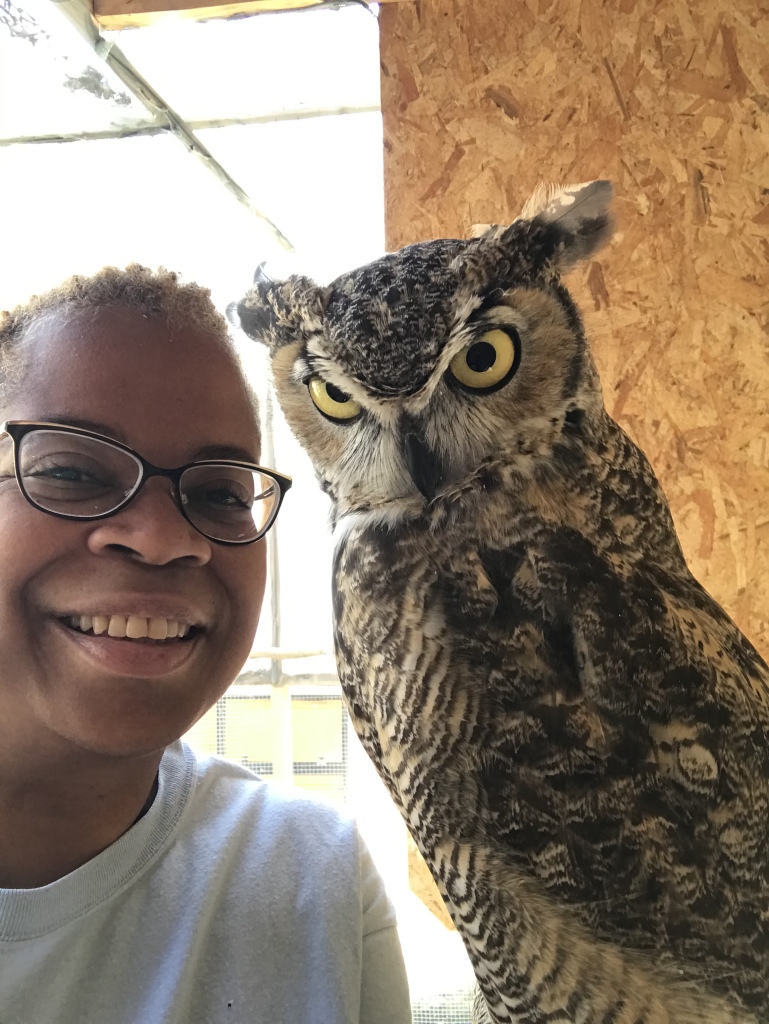
Sheila Lorrett Emerson (all pronouns–just keep it respectful) is a self-identified accomplice and a powerhouse of community engagement and advocacy. As the current president of Parents, Families, and Friends of Lesbians and Gays” (PFLAG) Philadelphia, she has been instrumental in fostering resilient relationships within the community. Sheila’s dedication to advocacy recently took center stage when she represented PFLAG at the 60th Anniversary of the March on Washington, addressing attendees from across the nation. Her tireless commitment to fostering understanding and support remains a beacon for all in the realm of community outreach and unity. They are also a DykeDance Committee Member, which raises funds for local Philadelphia organizations at Summit Presbyterian.
What does Pride mean to you?
“Pride is like Black History — it’s not only a month, Pride is 365. Pride is representation so that children, youth, and young adults see role models and know that they can grow up and be anything they want to be, thrive, and have hope. It’s making sure that everyone in the LGBTQIA+ community and their loved ones know they are not alone and that resources and support are available whenever and wherever they need them. It’s a time to help heal, hug, or hand bump, and celebrate the entire LGBTQIA+ community and those who support them.
“Pride is advocacy and fighting for legislation that protects and affirms the LGBTQIA+ family. Pride is educating folks within and without the LGBTQIA+ community. Let’s face it, just because you might identify as Queer doesn’t mean you are educated in all issues facing the LGBTQIA+ community. And to quote the Flyjock Tom Joyner, Pride is a party with a purpose!”
What LGBTQIA+ work or advocacy would you like to see more of in Germantown?
“Black Trans Women experience more violence, murders, homelessness, unemployment, food insecurity and are probably the most marginalized and misunderstood community in the United States. Wouldn’t it be beautiful if we turn that around and have more safe havens in Germantown for Black Trans Women who can receive the resources they need easily and efficiently? Wouldn’t it be fabulous if we supported Black Trans Women like the August 5, 2023 Montgomery Riverfront Brawl? A Black Trans Woman could throw something up in the air, and folks would come running with their folding chairs to protect and support them.”
What neighbors would you like to uplift?
“You Rasheed! Your advocacy and education through your professional channels, podcast, and social media [are] impactful! I applaud you for being out, proud, and unapologetic. We need more folks like you who, in the words of John Lewis, cause good trouble, necessary trouble!”
Billy Green
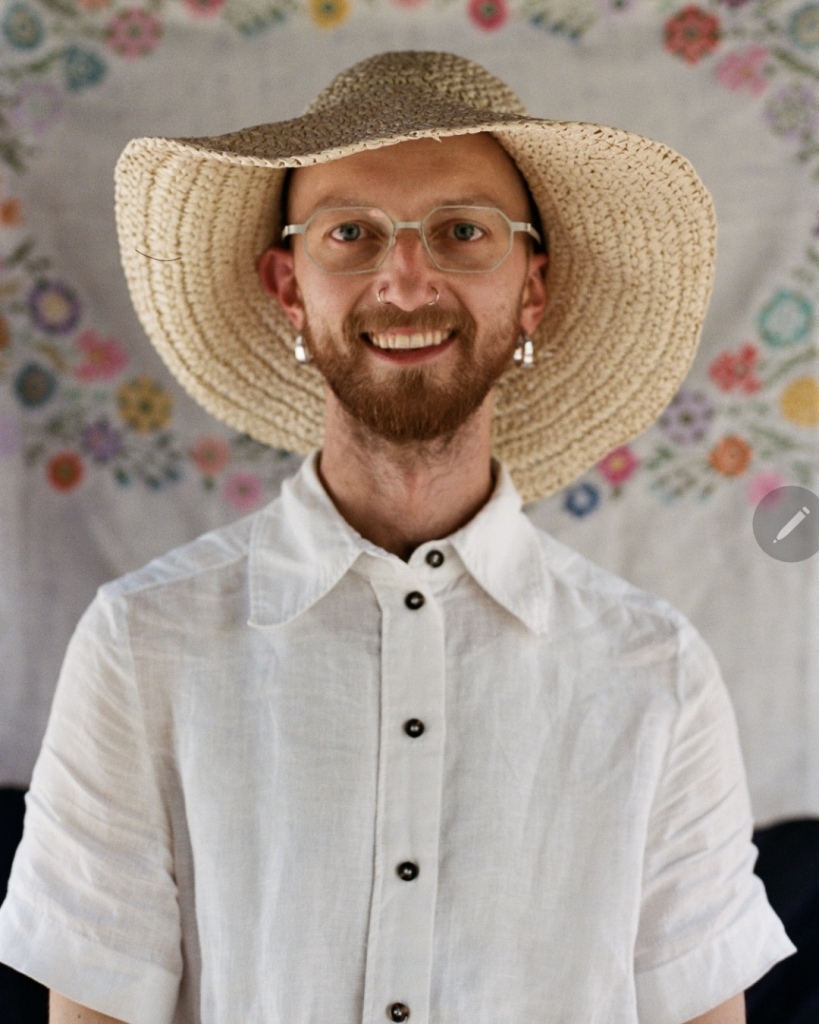
Billy Green is a Non-Binary, autistic person. They work as a barber during the week and operate the Germantown Farmers Market on the weekend. They focus on creating welcoming and sensory-conscious spaces for LGBTQ+ communities in Germantown. They believe in building and maintaining long-term connections with Queer individuals. They enjoy creative projects, gardening, and walking around Germantown in their free time with their partner and dogs.
What does Pride mean to you?
“Capital P Pride is often marketed as love and acceptance through alcohol-centered, sensory-overload events. As a sober and autistic Queer, my takeaway from pride is really about understanding and connection. Introducing more LGBTQ+ visibility to neighborhoods around the city will create more understanding that we are not alone, and that we may have more queer folks in our own neighborhoods than we think we do. Connecting over one another’s differences and similarities within an intersectional space is what makes pride so wonderful. Honoring previous generations and the work done to create a month to celebrate queerness is important in contextualizing how far we have come as a community.
“In order to continue the previous generations work, we must also be producers and not just consumers. How do we want to be remembered as a queer generation, and what steps are we taking to uplift and support the future LGBTQ+ generations?”
What LGBTQIA+ work or advocacy would you like to see more of in Germantown?
“I would love to see other LGBTQ+ stewardship evolve in the northwest Philly region. It would be wonderful to see more platforms that uplift all of the amazing queer community members of various backgrounds and generations. There are not many LGBTQ+ third spaces in Germantown for Queer folks to meet their Queer neighbors and bridge connections. These spaces don’t just happen, and no one is going to create them for us. It’s up to us to facilitate these pockets of community in which we would like to see for ourselves.
“I see a lot of Queer consumers holding Queer producers to a very high and sometimes unrealistic standard. Let’s normalize asking folks who are facilitating spaces or curating events how we can better support them. Let’s normalize asking event attendees what they want to see represented in their community. Let’s be present in the ways that we can when there are events happening. I would love to see more LGBTQ+ folks in Germantown convening to collaborate and be in community with one another.
“We spend so much time addressing singular pronouns — they/them, she/her, he/him, etc, that we sometimes forget about the collective we/us and how we can work together to create the spaces we envision for ourselves.”
What neighbors would you like to uplift?
Billy names Vernon Wilkins the “Carrot Cake guy!”
Kris Henderson
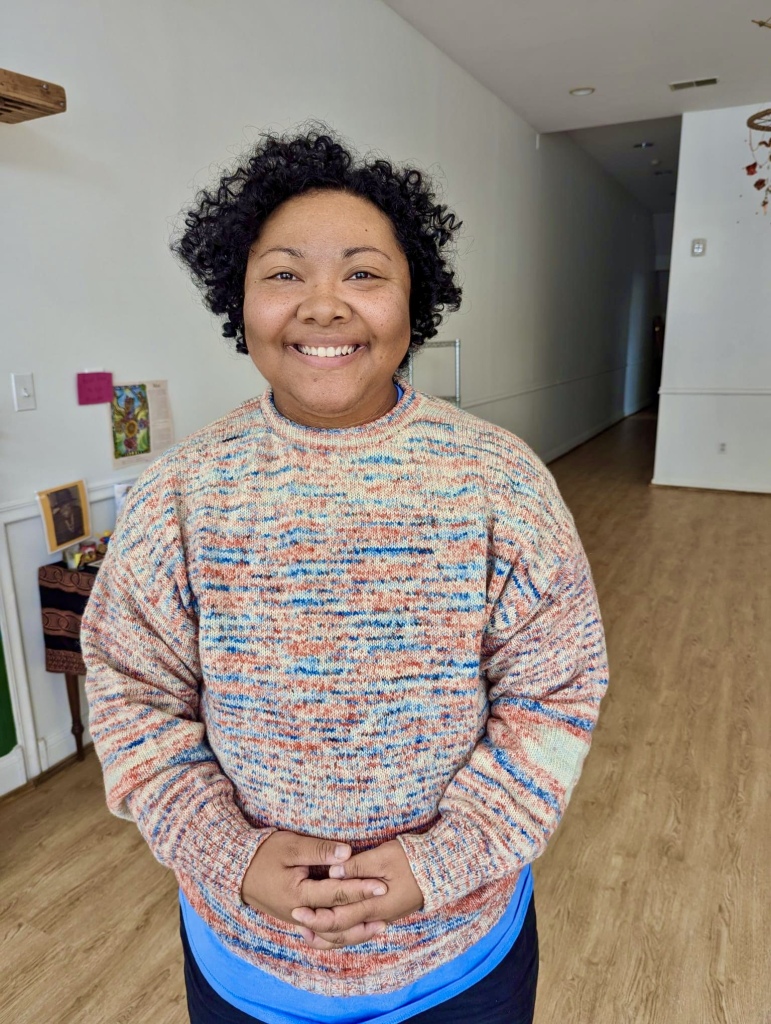
Kris Henderson (they/them) identifies as Queer and Agender, and their work focuses on advocacy associated with Amistad Law Project. On a state level, Amistad Law’s work focuses on people serving life without parole sentences and trying to get them home. On a city level, they are seeking funding for a mobile crisis unit, which could respond to mental health and behavioral health crises without police. They are an active hobby-er, with hobbies ranging from sewing to poke tattooing to baking.
What does Pride mean to you?
“I think pride is the time to remember the legacy of, especially, the Black and Brown Trans women who fought to make sure that black people make sure that queer people are moving towards liberation. Also, a time for parties. I’m not gonna lie.”
What LGBTQIA+ work or advocacy would you like to see more of in Germantown?
“I always want there to be more spaces for young people. I remember being a young person and, like, being queer and, like, looking for space in the community. But I think also, like, sober spaces for even adults, it can be hard to figure out, like, where to actually build community and meet Queer people and similar folks that are not at a party or not at a bar. And so I would like more of that.”
What neighbors would you like to uplift?
“Rah [Noonan-Ngwane], who works with Seth [Anderson-Oberman]. That’s the first person I think of. I think they’ve been trying to build, especially, electoral power in Germantown. And I think that is an important part of where we are right now. It’s sort of like the arc of how we could win.”
Gary Hines
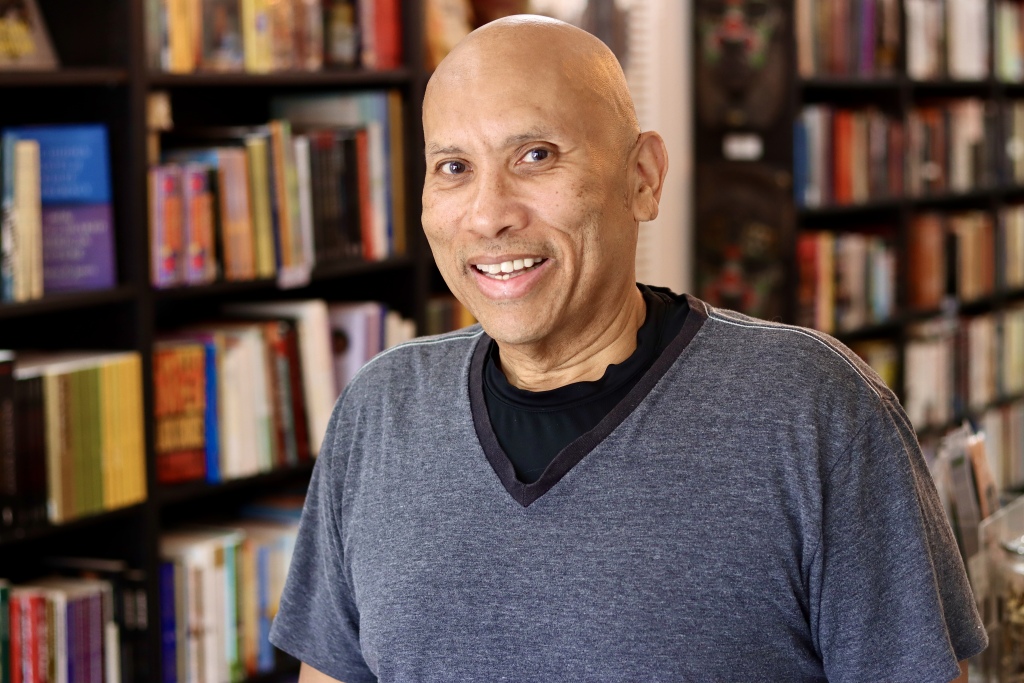
Gary Hines’ (he/him) career spans education roles. He currently runs a career consulting business under his namesake, where he helps individuals transition into new industries or find employment opportunities. He is presently working with Germantown Avenue Crisis Ministry on their strategic planning and advocates heavily for community spaces for the LGBTQIA+ community.
What does Pride mean to you?
“Pride means to me, being able to express yourself, your true self, who you really are, with no holds barred. And I think that it means you can do that in a variety of ways. It can be the way you appear to the public or to your family and friends, how out you are. And again, I think it’s a choice about being how out you choose to be. But I think Pride just means expressing yourself and showing the world who you are and being comfortable with that.
“In a broader sense, I think pride means acknowledging that there is a community out there that we’re no different from any other ‘straight’ community. We have the same needs, wants, desires, and aspirations in life. So I think just being comfortable around that, celebrating that. However you choose to do that, it could be music, poetry, a variety of ways, or just advocating and working with other folks, helping people out. So, yeah, Pride just goes a long way in that definition.”
What LGBTQIA+ work or advocacy would you like to see more of in Germantown?
“I think that there needs to be a central something. I don’t know whether it’s a meetup. I don’t know if it’s a space, but someplace where folks feel comfortable to come and share. So this is, I’m sure, predating you, but back in the early nineties, since you were only born in the nineties, there used to be a thing here called the Wissahickon Valley Group. I don’t know if you heard that term before, but that encompassed all of the Northwest [Philly area]. So, people from Roxborough, Manayunk, and East Falls would meet at different people’s houses for potlucks. And that was sort of a community-building thing. But I think once some of the principals passed on or moved away, it kind of fell apart.
“But if we’re talking about the economic issues, or housing, or sustainable wages, and the kinds of things that my good friend Seth [Anderson-Oberman] talks about a lot, you know, just mobilizing and getting things that we need regardless of our sexuality. So, a workshop-specific or talk-specific discussion or panel discussion would be of interest on topics like that. Am I getting pushed out of my neighborhood because of these high-end developments coming along? And what does that mean to me as a Queer person? Am I going to have discrimination issues trying to apply for an application to get in somewhere? Yeah. That kinda stuff.”
What neighbors would you like to uplift?
Gary uplifts Emaleigh Doley, attorney Craig Austin, and drummer Karen Smith.
Shakira King

Shakira King (she/they) is a Queer organizer and activist specializing in literacy, youth support, and mutual aid. Over the past decade, Shakira has been recognized for their passionate activism and dedication to young people and literacy. Shakira played a crucial role in organizing with BLM Philly and has contributed to national and international initiatives like NoName Books.
They focus on supporting Black children in North Philadelphia through literacy programs. This year, Shakira was recognized by the City of Philadelphia for establishing a successful mutual aid fund in 2020, which they aim to continue. Their work is driven by a commitment to meeting basic needs and promoting the idea that Black life is more than just surviving but thriving.
What does Pride mean to you?
“I think it means what our, you know, poor folks have fought for. The ability to be recognized as whole human beings. The ability to create a community that works for them. The ability to have families, careers, and homes without people consistently being worried about who you are intimate with, who you love, and how you show up in the world. It means telling our history over and over again until we get it right and until people recognize us on a level that says, ‘Oh, this actually does matter and is integral to the Black struggle.’ It means, honestly, radical self-love and self-acceptance to me. It means radical communal love because you must love your people to do this work. And it honestly means just not giving a fuck. You know, about the systems that consistently tried to tell you down.
“I think what’s most admirable about Black Queer history is we watch people just persevere and grow and thrive in places they really should not have. So, it’s about being tenacious, right? It’s about being a pain in people’s hind parts until they see this is not something that’s gonna stop.
“And then also, for me, as a Black Queer Christian, it means that God also loves me. And despite what you say, there’s no way that you can flip a text to tell me that I’m not included in this thing that is very obviously about all God’s people.”
What LGBTQIA+ work or advocacy would you like to see more of in Germantown?
“Yeah, housing. And mostly job security, because I notice that, you know, as. As the world has moved in a more conservative way, folks just move with the times because it’s easier to fall in line with what’s wrong than it is to stand up for what’s right. And I think Germantown is a very welcoming place. It’s a very homely place. But, you know, I’m thinking of a young man who just lost his life. And I wonder what we’re teaching our young people about when people are living their lives, minding their business, and you may not agree with how they show up in the world. Why does that require you to be violent?
“I’m thinking of how our community is solid. It is beautiful, and it’s made up of neighborhoods that have existed and neighbors that have existed forever and ever. But I think it’s time for us to open up in a way that says we include all these people, and we will not discriminate against you because you need a place to stay or because of who you love.”
What neighbors would you like to uplift?
“Honestly, you (Rasheed) are the one who comes to mind all the time because I know that you’ve been fighting to be seen in this realm for a really long time. So, you know, I’m proud of the way that you’ve been able to make space for yourself. So, I appreciate doing the work y’all are doing the work in boosting and reporting on information that nobody else really is.”
Daralyse Lyons
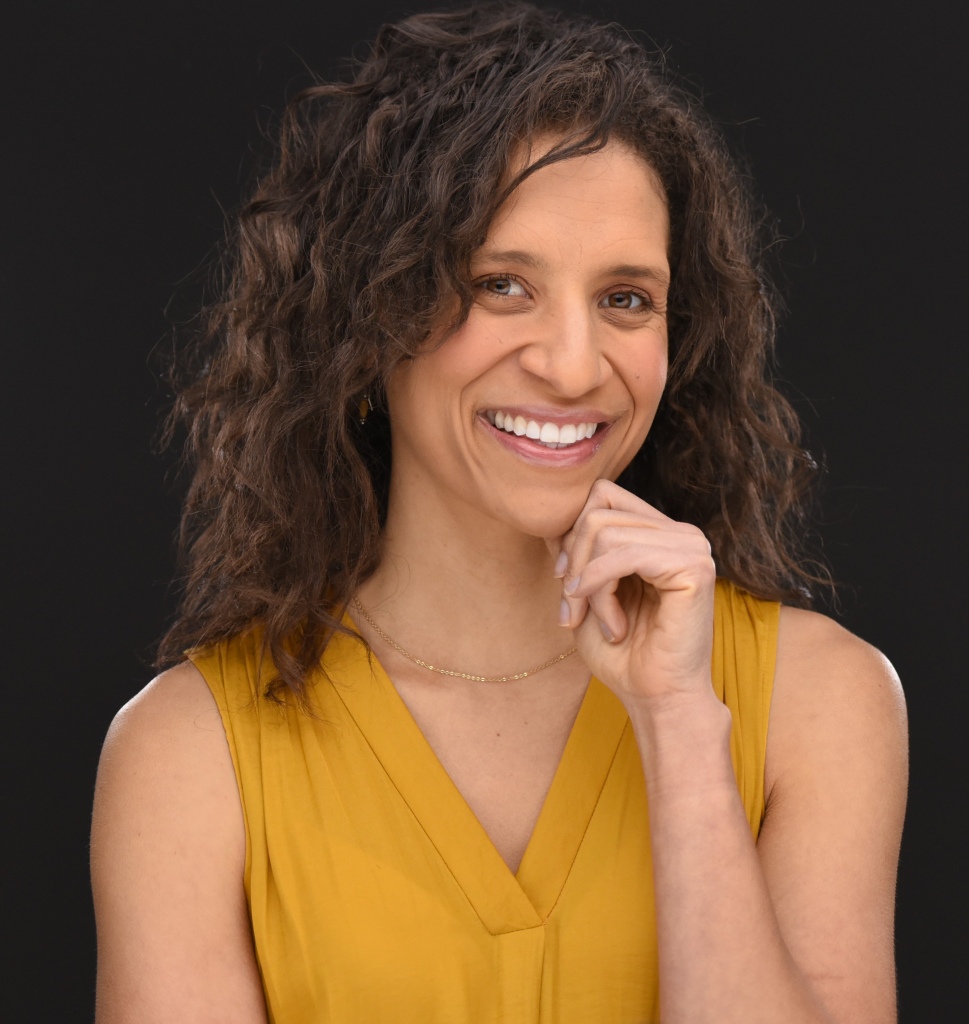
Daralyse Lyons (she/her) is a Biracial and Bisexual woman living with Ehlers-Danlos Syndrome, which is a connective tissue disorder. They currently work with the Chestnut Hill Local and Mt. Airy Local, which they’re passionate about. The most meaningful thing to her is community engagement, being able to serve the needs of people, and being a listening ear as someone coming from a DEI focus on journalism and consulting work.
Under her belt in journalism, recently, Lyons has both the Demystifying Diversity Podcast and On Being Biracial Podcast. She’s also the author of Demystifying Diversity and an upcoming children’s picture book, “Biracial Like Me.” Last year, she won the City & State PA award as one of the 75 Most Impactful People in the State of PA. She is also the Vice President of the National Lesbian and Gay Journalists Association-Philly Chapter.
What does Pride mean to you?
“I think that pride is both communal and personal. It is deeply personal and also part of being a member of a community. And I would say that I love the LGBTQ community in Philly. I feel grateful to be a part of it. Prior to the pandemic, I was a member of Bi Plus Philly, which has not [survived] a global pandemic. But it’s been really important to me. The community element of Pride, the coming together, the seeing oneself reflected in others.
“And then there’s kind of more of the internal experience that I think both of them are things that I have only had access to from 20 plus on. And I wish I had access to those things earlier. And I hope that I can be an example for young folks coming up to see themselves represented, you know, the myriad of their identities, someone who is multiracial, someone who is bisexual, someone who lives and works with a disability. And. Yeah, because I think community is important, but also, so is individual practice.”
What LGBTQIA+ work or advocacy would you like to see more of in Germantown?
“LGBTQ+ folks intersect with and occupy so many different communities and issues, and I would like to see LGBTQ voices raised in conversations that are already happening. Things like healthcare, economic perspectives, affordable housing, and issues of gentrification. And, you know, who we love, where we live, the work that is available to us, like, you know, raising the minimum wage. Right. Like, thinking about LGBTQ populations and how we are impacted in religious communities, in mental health, you know, in our communities. I think that it’s important to fight for and strive for the rights of LGBTQ+ folks while not believing that those rights are siloed or that we exist in isolation. I think that we are part of every single community that exists.
“And the more that is brought to the forefront, I think the more that. The more that our voices will be heard, the more that we will prevent some of the mental health concerns, healthcare issues, feelings of ostracization, familial and religious trauma, etc, that befall people.
“So, yeah, I don’t separate LGBTQ issues from other issues of advocacy. At the same time, I recognize that sometimes our needs are unique. And that’s true, I think, for any underrepresented demographic that, like, you know, those needs may be unique, but I think that they’re part of a collective whole, for sure.”
What neighbors would you like to uplift?
“Well, I’m gonna say you (Rasheed)! I feel like you amplify and lift other people with the work that you do, and those are the people who I am most supportive of or people who are supportive of others. I also feel like you bring authenticity to your work and a voice that is uniquely yours. And I think that–particularly in the journalistic space–a space that has been so predominantly white [and] so heteronormative, is changing. But I think it can be hard to maintain one’s voice and authenticity in those spaces. And so I love that you do that, and it excites me.
“And also Beth Stroud. She inspires me because of her unwavering commitment to like herself and to being authentic, her capacity for forgiveness and her capacity to practice. Grace is really inspiring to me. And I really admire her. Also, one of my majors in college was religious studies. I’m also, I’m very passionate about the intersections of religion and various marginalized identities and how religion can both support and uplift but also sometimes cause harm when yielded incorrectly. And so I just, she’s someone who really, I’ve never met her, but her story really speaks to me. ”
Chantelle Todman
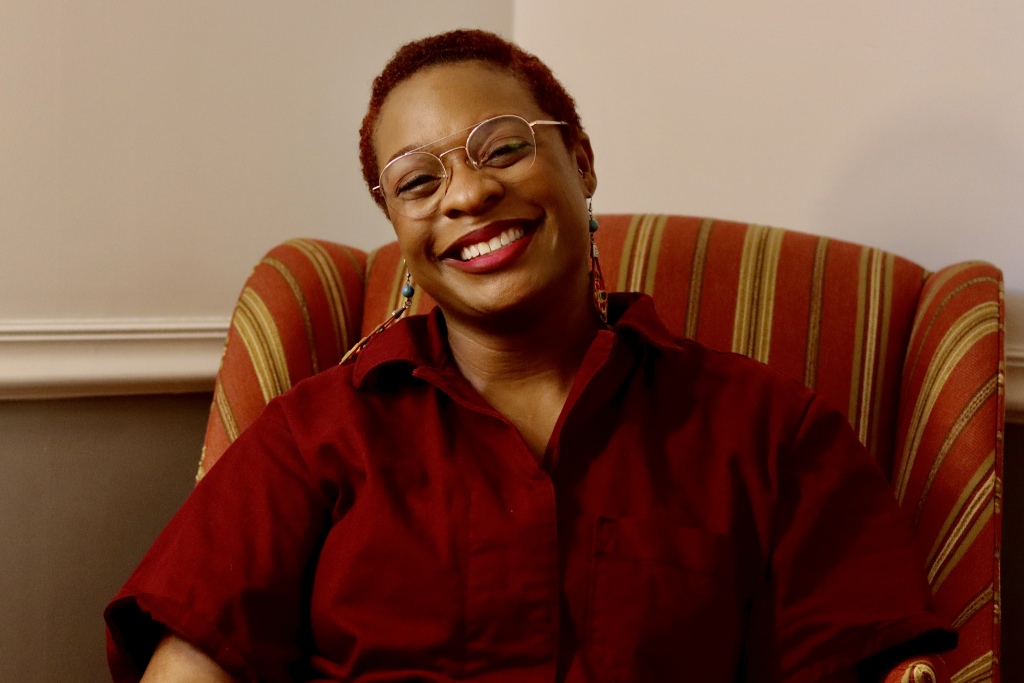
Chantelle Todman (they/she–”heavy on the they”) is a Queer, Pansexual, and Genderqueer healer, artist, and community builder. They are the founder and director of Black.Bird.Rising (BBR), which is a healing community center focused on nourishing Black, Queer, and Trans people — and those who love & support them. They see themselves as a “convener in [the] space of bringing us together.”
What does Pride mean to you?
“Pride means a celebration that we’re still here and that we’re not just surviving. We’re also thriving.”
What LGBTQIA+ work or advocacy would you like to see more of in Germantown?
“I love this question. So, [Black.Bird.Rising] is an embodiment of what I dreamed of for Black, Queer, and Trans folks to have as spaces for us to connect that are third spaces that are about our healing and our flourishing, about our artistry.
“I love a good party, but I would love to see something more than a party. I like to see some community building and some coalition building, especially happening in the Northwest [Philly area], and really spaces to support people with families, people who are looking to build Queer family building and resource sharing. So I would love to see more of that with the parties, because I do love a good party.”
What neighbors would you like to uplift?
“Hmmm, you know I am a BIG fan of Desiree Thomspson (Philly Herb Hub & Germantown United CDC) but also want to lift Craig, a Black, Queer Nonbinary Germantown neighbor who is a yoga instructor and will soon be graduating as a licensed acupuncturist and seeing folx at BBR this late summer/early fall! Excited to have another healing modality be accessible in Germantown, especially for Queer & Trans folx. Their IG is @craiggyboiwellness.”

